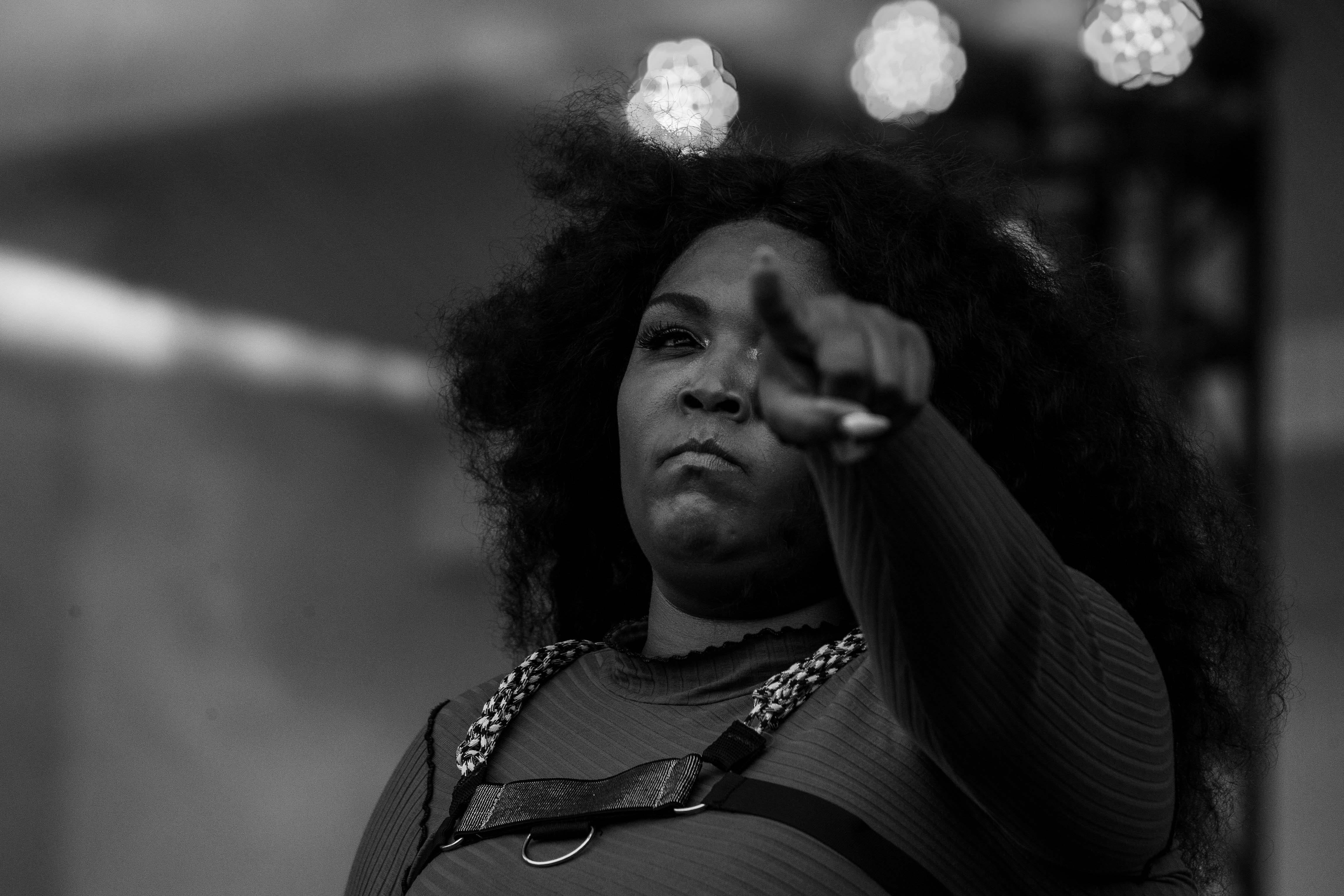In search of new music? Look no further. From Stephen Malkmus to Beth Gibbons to Lizzo, here’s what we recommend from the month that brought you drunk faux-Irishmen partying in green shirts and, (finally), the end of winter.
Westkust, Westkust (March 1, Run for Cover)
It’s hard to believe their self-titled is only Westkust’s second album—the high-energy Swedish dream pop group has been around for nearly a decade, but the two-and-a-half releases comprising their discography haven’t aged a bit. Westkust opener and lead single “Swebeach” hardly sounds like it’s seven years removed from “Touch,” while even the wobbly bass-led closer “On the Inside” feels well within their wheelhouse.
— Mike LeSuer
Amanda Palmer, There Will Be No Intermission (March 8, Cooking Vinyl)
Amanda Palmer’s new album is raw, ragged, and wriggling. Alone with a ukulele and a piano, she sings about abortion, her literary mentor Judy Blume, her best friend’s death from cancer, and becoming a new mother at the age of thirty-nine. Album standout “Voicemail for Jill” was accompanied by a heart-wrenching music video, following a girl on her way to get an abortion: “It’s a strange grief but it’s grief,” Amanda comforts the ambiguous Jill. But “A Mother’s Confession” is my favorite: it’s a piano tune about Amanda’s son Ash, a baby she had after many years of purposefully not having children. It begins quietly, but as Amanda details stories of accidentally stealing things from stores because she’s so tired and overwhelmed, being late and getting pulled over by a cop for speeding, and leaving little Ash in the car by accident, her voice swells to a rallying cry: “At least the baby didn’t die!” I’d imagine it’s not easy to make a great record and keep a child alive at the same time, but AP has done it. — Anya Jaremko-Greenwold (Read our feature on Amanda Palmer here.)
SASAMI, SASAMI (March 8, Domino)
SASAMI recounts the demise of romantic and platonic relationships in plain, candid language onto which listeners can easily project their own experiences. Across the album’s ten earworms, Sasami Ashworth advances a quiet, bitter, gripping sound built on taut, sparse, dizzyingly arranged guitar work and whisper-like, slightly nasal singing. Her combination of intense relatability and softly growling hooks makes SASAMI incessantly replayable. — Max Freedman (Read our feature on SASAMI here.)
Stella Donnelly, Beware of the Dogs (March 8, Secretly Canadian)
Having no option but to play on an electric guitar became the catalyst for tapping into a new kind of songwriting for Stella Donnelly, on full display in her debut album Beware of the Dogs. While Donnelly could be passed over as a sweet, confessional folk singer channeling her emotions through an amp and effect pedals, it’s the manner in which she delivers it all in a lyrical coating of piss and vinegar that makes her such a compelling new voice. With cutting honesty and blunt imagery, Donnelly has no qualms about putting an unforgiving spotlight on the worst inclinations of men. Her songs are a prescient soundtrack to the #MeToo era, demanding that men be better, and women appreciate their own worth. — Mike Hilleary (Read our feature on Stella Donnelly here.)
Justus Proffit, LA’s Got Me Down (March 8, Bar/None)
The concept of an Elliott Smith collaboration with the Flying Nun Records crowd may not have been something you’d considered until hearing Justus Proffit’s jangly guitar and slacker croon on “Hole,” a recently shared taste of his upcoming debut LP, LA’s Got Me Down. Hot off his joint EP with Jay Som, the record addresses the ugly side of the titular city lurking beneath the glamor, with the standout “Hole” providing a brief fantasy of having some control over his environment. — Kim March
Shady Bug, Lemon Lime (March 8, Exploding in Sound)
“Mathy” may not be a term that comes immediately to mind when listening to Hannah Rainey’s slack rock falsetto and calculated shredding, but the intensity of Shady Bug’s start-stop energy—and their tendency to zig as much as they zag—bears some resemblance to the Zach Hill projects of yore. From the heaving opening cords of “Make it Up” easing into its tranquil verses, to antsy closer “Flake” resolving with a sax solo, Lemon Lime is full of surprises. — Mike LeSuer
The Faint, Egowerk (March 15, Saddle Creek)
While distinctly Faint-like, Egowerk is pretty dissimilar to anything the band has released to date. The menacing title track is as close to straightforward pulsing darkwave as The Faint has ever come, matching the irrefutably not-dorky trend set by indie labels like Felte and Dais. Similarly, the trap beat breakdowns on “Own My Eyes” feel effortlessly of-the-moment. Like their iconic Danse Macabre, each track has a distinct personality while blending seamlessly into one another. — Mike LeSuer (Read our feature on The Faint here.)
Stephen Malkmus, Groove Denied (March 15, Matador)
On Groove Denied, Stephen Malkmus shows that “different” isn’t necessarily synonymous with “bad.” Across ten tracks, he serves up heavy doses of twitchy drum machines, icy synths, and stark vocals reminiscent of late-’70s post-punk, balancing the weird with just enough of his languid guitar-rock sound to keep it familiar. Listening to Groove Denied is like hanging out with an old friend who just got back from study abroad. Sure, you used to listen to Dinosaur Jr. together, and now all he wants to talk about is Kraftwerk—but there’s an earnestness in his voice that makes you want to hear what he has to say anyway. After all, he’s still the same person. — Carrie Courogen (Read our feature on Stephen Malkmus here.)
Nilüfer Yanya, Miss Universe (March 22, ATO)
On her debut album Miss Universe, Nilüfer Yanya satirizes and unpacks the ways in which we suppress painful truths in order to maintain comfort. The twenty-four-year-old London-based musician created a self-care protagonist named “Miss Universe,” the voice of the (fictional) organization We Worry About Your Health (WWAY Health). These songs are dipped in Yanya’s tear ducts, flung across the room in the rage of denial, and finally folded neatly upon a cool bed to rest. Yanya is aware of her autonomy on “In Your Head,” but struggles to grasp control over the next few songs: “I can do what I like / I’ll never know what it means / Some validation is all that I need!” Her voice bounces between airy falsetto and a stiffened squeal. It’s the type of rallying call that WWAY Health preys on people with. — Margaret Farrell (Read our feature on Nilüfer Yanya here.)
La Dispute, Panorama (March 22, Epitaph)
La Dispute’s Panorama lives within the pastel Blade Runner 2049 universe of its album art, the surreal landscapes of its cover—and accompanying desktop game—representing the bewilderment of songwriter Jordan Dreyer in his new, unfamiliar home far from Grand Rapids. Both as talk-y and as shout-y as previous chapters in the continuous epic that is La Dispute, Panorama feels totally fresh following the band’s five year break since Rooms of the House, with anxieties flaring to new intensities and insecurities finding less sound to hide behind. — Mike LeSuer (Read our feature on La Dispute here.)
Quelle Chris, Guns (March 29, Mello Music Group)
Guns is a tour de force, bouncing between art rap, lo-fi filth, and straight hood bangers—but its title may deceive. “Guns” is a loaded word in our fraught political era, and any mention of it brings to mind NRA shrills hiding behind shell counts and bump stock bans. But Chris has a different idea: This record is a display of his arsenal and an examination of weaponized art. What makes Guns so effective isn’t the way Chris moralizes or teaches. Rather, he sits back and posits, asking more questions than he answers. He’s a facilitator for a greater discussion, whether that comes in the form of a Mach-Hommy featuring track about fur or an analysis of healthcare and inner-city struggles. — Will Schube (Read our feature on Quelle Chris here.)
KÁRYYN, The Quanta Series (March 29, Mute)
The reality of our contemporary short-attention-span information culture is that monumental human rights crises are matter-of-factly pushed out of the media spotlight long before any reasonable resolution can be found. But the ineffable American songstress KÁRYYN mines her Syrian heritage on a stirring meditation about “Aleppo,” a civil war–torn city, on her debut album. “From the deep end, memory separates, dissipates,” she sings over a haunted, fractured soundscape, and it’s hard not to feel the chill of serious tragedy. This may be her first full-length, but KÁRYYN is hardly an unknown talent—she’s already collaborated with conceptual artist Marina Abramović, plus Björk called her “an inspiration.” — Ken Scrudato
Laura Stevenson, The Big Freeze (March 29, Don Giovanni)
Laura Stevenson’s album is pretty glorious in parts—the way her voice fractures into harmonies and her intimate, visceral lyricism (“This acid flush of shame can only be man-made”). It’s both intense and urgent, which is fitting since the album was inspired by apocalyptic climate change and the complete icing-over of human empathy. Stevenson isn’t just making a political comment here—she’s also discussing complicated, unhealthy relationships. The Big Freeze is about attachment to not only the earth we inhabit, but to those we inhabit it with. — Margaret Farrell
Beth Gibbons, Henryk Górecki: Symphony No. 3 (March 29, Domino)
Remember Beth Gibbons, the mysterious frontwoman of iconic British outfit Portishead? She’s collaborated with the Polish National Radio Symphony Orchestra to sing on cult Polish composer Henryk Górecki’s third symphony, which first debuted in 1976 but received new life when it was revived by Nonesuch in 1992 and became a hit (now, it’s regularly used in tv commercials and on film soundtracks). Gibbons learned the original Polish text to sing it, despite not speaking the language (impressive) and stretched her voice to accommodate Górecki’s soprano writing (though she’s a contralto by nature). Gibbons is no opera singer, and the range is perhaps a bit high; but her unique sound—equally hushed and tormented, as is her style—brings the transcendent contemporary classical piece down to earth a little. — Anya Jaremko-Greenwold
Lil Nas X, “Old Town Road”
Whatever your opinion of the trap-country hybrid “Old Town Road” by Lil Nas X, it’s significance to an ongoing discussion of genre, race, and chart placement is indisputable. This song debuted on the Billboard charts three weeks ago, but in a controversial move last week, Billboard removed it from the country chart (though it remains on the rap and hip-hop lists). In the wake of Solange’s new album When I Get Home, the complicated relationship between race and country music is paramount to the conversation around categorization, exploitation, and marginalization of non–white/cis/male artists. Loaded context aside, Nas X’s throaty, Auto-Tuned croon is suave and satisfying, as the creak of banjo strums mingle with drum machine triplets. It’s a swift two minutes that float you back to a dusty dirt road where freedom and fresh air awaits. — Margaret Farrell
https://www.youtube.com/watch?v=5ho88VXJTBg
Flaural, “1616”
Speaking of Tame Impala, this mile-high Denver band frolics in the same rolling meadows as that band’s debut, Innerspeaker. Feel-good flower child vibes permeate this swirling symphony of psychedelic love. Get some! — Scott T. Sterling (Listen to the song premiere here.)
&More, “Future Come Around”
Do you want more?! This Philly duo embodies the city’s rich musical history with a high-minded mélange that defies genre and categorization. It rumbles like hip-hop and rolls like rock, and that’s just the beginning. So deep that one of them is Questlove’s sister.
— Scott T. Sterling (Listen to the song premiere here.)
Jenny Lewis, “Dogwood”
The last time we spoke to Jenny Lewis, she told us of a song on her then-upcoming album about dogwood—the wood used for Jesus’s cross. She didn’t know the religious significance until after she wrote the song, she said, but thought the flowers were beautiful. “Dogwood,” off Jenny’s fourth solo album On the Line, is a mournful, slow ballad that sounds like the beginnings of spring. “There’s nothing we can do but screw and booze,” she sings, resigned to a continual love affair with someone who’s as fleeting as the seasons, and apparently quite narcissistic. At the song’s conclusion is a classic, cutting Jenny zinger: “You thought I was your muse / But all along it was you.” — Anya Jaremko-Greenwold
Tame Impala, “Patience”
Kevin Parker is in full-blown superstar artist mode, making moves like his new friends Rihanna and Lady Gaga. “Patience” finds Parker cranking up the deep disco pianos for a shimmering summertime top-down golden hour classic. More, please. — Scott T. Sterling
The Greeting Committee, “Is This It?”
The future is in very good hands, as long as the likes of these Kansas City upstarts are in the mix. Led by the irrepressible Addie Sartino, The Greeting Committee represent the best of what’s next with sharp songwriting, big hearts, and open minds. They question pretty much everything on “Is This It?” And the world has yet to answer. — Scott T. Sterling (Listen to the song premiere here.)
Lizzo, “Tempo” [ft. Missy Elliott]
Lizzo is no stranger to flaunting her plus-size bod, and in this collaboration with rap icon Missy Elliott (where has she been?), she continues the fight to shake what her momma gave her. “Slow songs, they for skinny hoes… I’m a thick bitch, I need tempo,” Lizzo sings on the chorus. The song isn’t even that fast—it’s more damp and lustful and bass-heavy than up-beat—but her point is well-taken. — Anya Jaremko-Greenwold
Vampire Weekend, “Sunflower”
They’ve been called Paul Simon for millennials, which is actually one hell of a compliment. While that might seem hyperbolic, the point is not lost. Vampire Weekend is still finding new ways to present meticulous and ornate rock that keeps crowds riled up. For “Sunflower,” they’ve linked with Compton legend Steve Lacy for the most sparkling advance from upcoming May album Father of the Bride yet. — Scott T. Sterling







